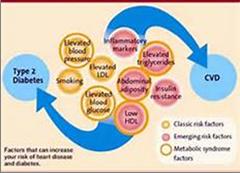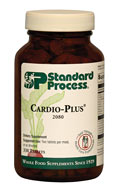Heart Problems and Diabetes

|
to believe nothing, than to believe what is wrong.” Thomas Jefferson |
The pathophysiology of the link between diabetes and cardiovascular disease (CVD) is complex and multifactorial. Understanding these profound mechanisms of disease can help clinicians identify and treat CVD in patients with diabetes, as well as help patients prevent these potentially devastating complications. Diabetes is a prime risk factor for cardiovascular disease (CVD). Vascular disorders include retinopathy and nephropathy, peripheral vascular disease (PVD), stroke, and coronary artery disease (CAD). Diabetes also affects the heart muscle, causing both systolic and diastolic heart failure.
According to science research 97% of patients with diabetes have increased triglycerides, increased levels of small LDL particles cholesterol and decreased HDL cholesterol. Cholesterol and triglycerides are two forms of lipid, or fat, those circulate in your bloodstream. They are both necessary for life itself. Cholesterol is necessary for building and maintaining key parts of your cells (such as your cell membranes), and for making several essential hormones.
Triglycerides, which are chains of high-energy fatty acids, provide much of the energy needed for your tissues to function. When you eat, your body converts any calories it doesn't need to use right away into triglycerides. The triglycerides are stored in your fat cells. Later, hormones release triglycerides for energy between meals. If you regularly eat more calories than you burn, particularly "easy" calories like carbohydrates, you may have high triglycerides (hypertriglyceridemia).
- How diabetes contributes to high blood pressure
- How diabetes contributes to chronic heart failure
- How diabetes leads to thrombotic death
- Why inflammation increases cardiovascular risk
- Why oxidative stress is another reason for cardiovascular problems











